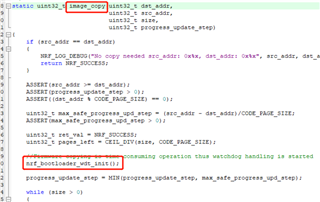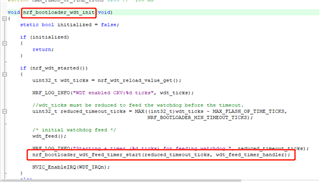Hi all
nrf52840 Development board,sdk is nRF5_SDK_15.2.0_9412b96,PC is windows 10 .My testing master device is cell phone(Huawei HTC and so on,android system),and using "nrf toolbox" APP.
I added watchdog function in my application,and then when I test the ble dfu ,I found that the watchdog feeding in the bootloader did not happen during app FW activation.
nrf_bootloader_wdt_feed_timer_start(reduced_timeout_ticks, wdt_feed_timer_handler);
wdt_feed_timer_handler is not called any time.Is this an SDK bug?
Thanks,
The log as follosw:






